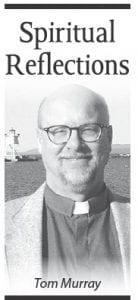On December 1, 1955 in Montgomery, Alabama, Rosa Parks boarded a bus, paid her fare and sat down behind the seats reserved for white people only. When the front of the bus filled up, the driver got up and moved the “colored” sign several rows further back, leaving her and three others sitting in what were now seats reserved for those with privilege and power. The other three submissively obeyed. Rosa Parks did not.
Parks was arrested, and the following day she was fired from her job. This gentle act of civil disobedience touched off a boycott of the city’s buses. For the next 381 days people of color walked and shared rides rather than ride city buses, until the Supreme Court ruled that the city’s segregation laws were in defiance of the Constitution.
Rosa Parks’ courage was profoundly rooted in her faith. She was a devoted Christian who carried a Bible with her at all times. What she did took incredible courage. Mob rule in the American South was still a part of daily life in 1955. Three black citizens had been lynched by white terrorists earlier that same year. It was this ever-present sense of debilitating fear that Rosa Parks drove a wedge into when she chose to be arrested rather than move to the back of that bus. She understood that the true enemy of righteousness is fear. She also understood that fear has no power over us when we live as resurrection people.
According to St. John’s account of the resurrection, when Mary Magdalene comes to the tomb on Easter morning and she sees that it is empty, her fears are exposed. She doesn’t run to tell the others that Jesus is risen. Instead, she runs to tell them that, “They have taken the Lord out of the tomb, and we don’t know where they have laid him.”
In the wake of the terror of Jesus’ crucifixion, Mary is living in fear of things she believes that she has no control over. In the midst of her fear, she comes to the conclusion that the powerful have once again prevailed.
Mary believes this, that is, until she sees Jesus with her own eyes. It is only then that she begins the slow process of accepting that her fears are misplaced. As she hurries to tell the disciples what she has seen, she takes her personal experience of Jesus with her. She now tells them, “I have seen the Lord.”
In the gospel text shared in many churches on the Sunday following Easter, Jesus comes to the disciples who only have Mary’s words to cling to and shows them the scars left in his body. Before the sun goes down, the disciples both hear Mary’s testimony and witness Jesus himself in their presence. And yet a week later, when Thomas joins them, they’re still hiding in a locked room. That’s the overwhelming power of fear.
It’s the same kind of fear that kept people sitting at the back of buses in Rosa Parks’ day. It’s the fear of what happens when those who are in power are challenged. It’s the fear of reprisal, violence and mob rule. The disciples are hiding because they are afraid that they will be dragged before Pilate and lynched just as their teacher was. Even though they have witnessed Jesus, they are not yet living his resurrection life.
We often live in much the same way as these disciples in the days following Jesus’ resurrection. Like them, our fears keep us from living as people who proclaim that Jesus is risen. We lock our hearts, hands and voices away in closed rooms when our doubts and uncertainties overwhelm us. We fail to share our resurrection life with others. The stories of Mary, the disciples and Thomas remind us that we can choose to remain behind our own closed doors out of fear, or we can live as people who have witnessed the risen Christ. That’s the choice the resurrection confronts us with.
We are reminded during these weeks of Easter that God invites us to do what Thomas did, who proclaimed what may be the five most important words ever spoken, “My Lord and my God.”
This disciple who we often associate with doubt is the very first to connect the dots; that Jesus of Nazareth, who was condemned by the righteous and sentenced to die by a howling mob, and who was hung from a tree while others mocked him, is our Lord and our God. Thomas is the first of the disciples to drive a wedge into the debilitating fear that often keeps us from witnessing what we believe.
We are now called to do the same. Through the wonder and the mystery of the word made flesh, we now rest in the promise of our resurrected Lord. When Christ died, we died with him. When Christ rose from the dust, we arose with him. We are called by our risen Lord to step away from our fears, and to live as people who are forgiven and claimed by God.
Each month a member of the Cook County Ministerium will offer Spiritual Reflections. This month’s contributor is Tom Murray of the Lutsen and Zion Lutheran Churches.



Loading Comments